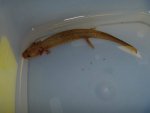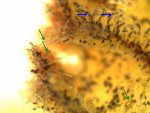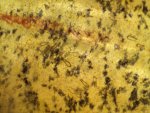Lamb
New member
- Joined
- Feb 28, 2009
- Messages
- 222
- Reaction score
- 12
- Points
- 0
- Age
- 37
- Location
- USA
- Country
- United States
Hello,
One of the larval red salamanders (Pseudotriton ruber vioscai) that I'm caring for in our lab has developed alarming symptoms. I fed and checked on everyone in the lab 4 days ago, and there was no indication that this individual wasn't doing well. When I went in to feed earlier this evening, I was shocked (see photos).
The gills are very red, and curled. The best sense that I can make of it is that there has been excess sloughing of the skin on the limbs, especially the front legs. Or maybe the whitish transparent stuff is fungus? Regardless, the skin on the legs is very red. There are also behavioral changes. The individual would hold it's pelvic girdle off the bottom of the tank (pushing down with its front limbs and tail). When I gently scooped it up to place it in a smaller tank, it barely moved (usually they swim like mad), and I could almost flip it on to its back. Then, when I placed it in a salt bath (described later), it moved around a little, but it looked like it took a lot of effort to do so. Another oddity, it has lighter patches of skin on its back, but they don't appear to be fuzzy and aren't white (just a bit lighter than the normal background color).
After searching through the forums, and consulting Axolotl pages, I thought that it might help to try salt baths and refrigeration. I placed this individual in a salt bath (3-4 g Cichlid aquarium salt per L water) for 15 minutes, and then changed the water for water at the salt concentration that we use in the lab. It is now sitting in the refrigerator in the lab, and I'll check on it in the morning. If it survives the night, I'll treat it as is recommended in Kaysie's salt bath post (http://www.caudata.org/forum/f46-be...axolotl/72698-salt-bath-picture-tutorial.html).
So, do I have the right idea in terms of treatment? Have others had animals come back after having reached a point where they weren't responding normally to stimuli (like touch)? Any other information would be appreciated.
One of the larval red salamanders (Pseudotriton ruber vioscai) that I'm caring for in our lab has developed alarming symptoms. I fed and checked on everyone in the lab 4 days ago, and there was no indication that this individual wasn't doing well. When I went in to feed earlier this evening, I was shocked (see photos).
The gills are very red, and curled. The best sense that I can make of it is that there has been excess sloughing of the skin on the limbs, especially the front legs. Or maybe the whitish transparent stuff is fungus? Regardless, the skin on the legs is very red. There are also behavioral changes. The individual would hold it's pelvic girdle off the bottom of the tank (pushing down with its front limbs and tail). When I gently scooped it up to place it in a smaller tank, it barely moved (usually they swim like mad), and I could almost flip it on to its back. Then, when I placed it in a salt bath (described later), it moved around a little, but it looked like it took a lot of effort to do so. Another oddity, it has lighter patches of skin on its back, but they don't appear to be fuzzy and aren't white (just a bit lighter than the normal background color).
After searching through the forums, and consulting Axolotl pages, I thought that it might help to try salt baths and refrigeration. I placed this individual in a salt bath (3-4 g Cichlid aquarium salt per L water) for 15 minutes, and then changed the water for water at the salt concentration that we use in the lab. It is now sitting in the refrigerator in the lab, and I'll check on it in the morning. If it survives the night, I'll treat it as is recommended in Kaysie's salt bath post (http://www.caudata.org/forum/f46-be...axolotl/72698-salt-bath-picture-tutorial.html).
So, do I have the right idea in terms of treatment? Have others had animals come back after having reached a point where they weren't responding normally to stimuli (like touch)? Any other information would be appreciated.







 Asian Newt Group
Asian Newt Group